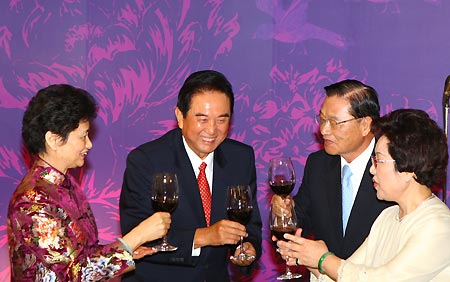
Chen Yunlin (2nd L), president of the Chinese mainland's
Association for Relations Across the Taiwan Straits (ARATS), toasts with Chiang
Pin-kung (2nd R), chairman of Taiwan-based Straits Exchange Foundation (SEF), at
a welcoming banquet in Taipei of southeast China's Taiwan Province yesterday.
Chen Yunlin arrived in Taiwan yesterday for a five-day visit.
--Xinhua
The Chinese mainland's Association for Relations Across the Taiwan Straits
(ARATS) chief Chen Yunlin arrived here on Monday to begin a five-day milestone
visit to Taiwan.
Chen's visit marked the first meeting in Taiwan between leaders of the ARATS
and the Taiwan-based Straits Exchange Foundation (SEF).
The talks were aimed at deepening cross-Strait economic cooperation "for the
benefit of compatriots across the Strait," according to mainland authorities.
The meeting was significant for the "institutionalization of ARATS-SEF
consultations" and the peaceful development of cross-Strait relations, said Xu
Bodong, a well-known Beijing-based scholar on the Taiwan issue.
Chen said after arriving here that tasks for the talks were "clear and
simple" and "for the good of the people on both sides".
He said the talks would not involve political issues. "No cross-Strait
political issues will be involved, nor will the island's internal political
affairs."
Each subject of the consultations would benefit both sides, and the ARATS
would "continue to work with the SEF with a positive and pragmatic attitude to
seek common ground and satisfactory results through equal consultation," Chen
said.
On Tuesday morning, Chen was expected to hold talks with SEF chairman Chiang
Pin-kung, their second meeting in less than six months.
They were to discuss cross-Strait direct shipping, air transport, postal
services, food safety and tourism, Chen said in a speech after landing at the
Taoyuan International Airport.
The two organizations would also host seminars for experts to exchange views
on financial cooperation in light of the international financial crisis, he
said.
As the consultations were closely linked with public livelihoods and economic
development across the Strait, analysts believed Chen's visit would be a
"win-win" trip. Chiang said Chen's visit to Taiwan was historic as well as a key
step in achieving peace and mutual economic benefit.
He believed their talks would yield fruitful results.
But Chen's visit was "a late appointment," Chiang said. "In the history of
cross-Strait communications, the moment came after six decades."
Chen said: "President Wang Daohan and Chairman Koo Chen-fu worked all out for
the moment to come, but their wishes could not come true."
In April 1993, then ARATS President Wang and then SEF Chairman Koo held a
historic "Wang-Koo meeting" in Singapore. It was the first public meeting
between leaders of the two organizations. They signed four agreements on
economic and trade cooperation.
"The two have passed away, but they must feel great relief if they can see
today's visit from the afterlife," Chen said.
On Monday afternoon, Chen also visited Koo Yen Cho-yun, the widow of Koo
Chen-fu, former SEF chairman who passed away in 2005.
"Today, SEF chairman Chiang Pin-kung and I realized the long-term wish of our
predecessors. We will carry on their cause and try our best to work for the
peaceful development across the Strait," he said.
POSITIVE RESPONSE
Taipei stocks rose 2.55 percent on Monday on hopes that the historic meeting
would further improve cross-Strait relations.
Meanwhile, major Taiwan newspapers published positive reports about the
historic cross-Strait talks.
"We welcome Chen's visit and expect the Taiwan public to treat him with
politeness for better cross-Strait interactions in the future," said the
editorial by the Taiwan-based Economic Daily News. "His visit bears great
significance to cross-Strait relations and regional peace and security."
Taiwan's Commercial Times said in its editorial that Chen's trip to the
island "symbolized a new era that cross-Strait relations are moved toward
reconciliation and cooperation from confrontation".
Xu Bodong told Xinhua that ARATS-SEF talks in Taipei marked significant
progress in institutionalizing such forms of consultation, from the previous
"one-way" visits to the mainland by the Taiwan side, to the current first trip
to the island by mainland officials.
It meant that ARATS and SEF had truly realized a "mutual visit," Xu said,
adding: "It is a great sign of the development of cross-Strait relations and a
big event destined to go down in history."
Statistics from the Taiwan side showed that about 1,030 reporters had applied
to cover Chen's visit, more than 800 of whom were Taiwan reporters, a record
number of Taiwan reporters covering a single news event on the island.
Founded in 1991 and 1990 respectively, the ARATS and SEF were authorized by
the mainland and Taiwan to handle cross-Strait exchanges. Negotiations had been
suspended for almost 10 years until June when Chen and Chiang held their first
meeting in Beijing.



